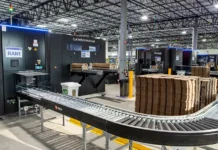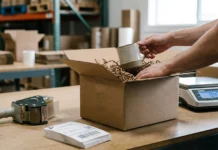What Blockchain Does for Logistics
Blockchain technology is like a digital ledger that is not in one place and can’t be changed. It keeps track of transactions in a safe and open manner. It gives everyone in the supply chain access to the same up-to-date information, which may truly change the way things are done in logistics and help solve the chain-of-custody problems that come up with time-sensitive goods.
Blockchain is basically a network of dispersed nodes that verifies and records each transaction in many locations. This arrangement makes it such that no one person or group can control the data, which lowers the risk of fraud or manipulation. Blockchain can provide you a clear and up-to-date picture of the status of each cargo, including its location, temperature, and how it is being handled.
For instance, IBM and Maersk are already using blockchain to make their supply chains more open and accountable. IBM and Maersk built the TradeLens platform, which lets people exchange shipping data on a blockchain in a safe way. This makes it simpler to keep track of containers in real time and improves communication between everyone involved.
Making things more clear and accountable
One of the best things about blockchain technology is that it makes the supply chain more open and accountable. Every transaction connected to a cargo is stored in a form that can’t be changed using blockchain. This makes it easy to follow the chain of custody. This is very important for anything that has to be delivered quickly, because any delays or mistakes may have big effects.
For example, the pharmaceutical business has rigorous rules that say firms must retain thorough records of their goods all the way through the supply chain. By using blockchain technology, these businesses can not only exceed legal requirements, but they can also provide consumers peace of mind that their goods have been treated in the best way possible.
Making goods more efficient when time is of the essence
Blockchain technology isn’t only about being open; it can also make the supply chain work better by improving logistics. Stakeholders can make rapid, smart choices when they have access to real-time data. This helps cut down on delays that happen when people aren’t sure what to do or don’t communicate clearly.
For example, a cargo that runs into an unanticipated problem. Blockchain sends out quick notifications to all relevant parties, so they may jump into action right away. In circumstances when time is of the essence, like goods, this type of quick response is particularly important. Blockchain may help businesses keep their service promises and make customers happier by cutting down on delays and problems.
Additionally, as more companies use blockchain technologies, they can say goodbye to extra paperwork and make communication easier all the way down the supply chain. This reduction in administrative work lets logistics experts focus on making strategic decisions instead of becoming stuck in manual record-keeping, which boosts overall efficiency.
The effect of blockchain on the economy in logistics.
Using blockchain technology in logistics has a big effect on the economy. The World Bank says that using digital technologies like blockchain to make the supply chain more efficient may save firms up to 15% on costs. This implies that operating expenses will go down a lot, particularly for businesses who need their goods to arrive on schedule.
Blockchain may do more than simply decrease expenses; it can also raise the value of assets by building confidence among stakeholders. Companies who can show they are open and responsible are likely to get more consumers and have an edge over their competitors in the market.
As global commerce grows, it becomes even more important to make sure that everyone follows the rules that apply to them. Blockchain’s immutable record-keeping may help firms deal with complicated rules and lower the dangers that come with not following them. This is particularly critical for anything that has to get there quickly, because the penalty for delays or maltreatment may be quite high.
Conclusion
The logistics industry is having a hard time keeping up with the fast-changing global commerce environment. Blockchain technology is a game-changer for solving the chain-of-custody problem with time-sensitive goods. Blockchain might totally transform how we keep track of and manage items in the supply chain by making things more open, accountable, and efficient.
Using blockchain in logistics not only lowers the risks that come with delays and misunderstanding, but it also makes the supply chain ecosystem more sustainable and robust. As more and more businesses realise how important it is to have an unbroken chain of custody, blockchain technology will definitely play a big role in the future of logistics.
Blockchain technology is poised to change the logistics sector because it can provide businesses the speed and openness they need to keep up with the demands of today’s economy. We can’t ignore how blockchain might improve the safety of time-sensitive freight operations as we enter a new era of supply chain management.





























